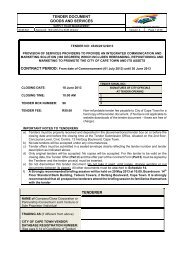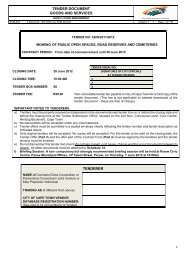Tender No.: 465S/2011/12 - City of Cape Town
Tender No.: 465S/2011/12 - City of Cape Town
Tender No.: 465S/2011/12 - City of Cape Town
You also want an ePaper? Increase the reach of your titles
YUMPU automatically turns print PDFs into web optimized ePapers that Google loves.
<strong>Tender</strong> <strong>No</strong>.: <strong>465S</strong>/<strong>2011</strong>/<strong>12</strong><br />
22. Penalties<br />
22.1 Subject to GCC Clause 25, if the supplier fails to deliver any or all <strong>of</strong> the goods or to perform the services within<br />
the period(s) specified in the contract, the purchaser shall, without prejudice to its other remedies under the<br />
contract, deduct from the contract price, as a penalty, a sum calculated on the delivered price <strong>of</strong> the delayed<br />
goods or unperformed services, using the current prime interest rate, calculated for each day <strong>of</strong> the delay until<br />
actual delivery or performance. The purchaser may also consider termination <strong>of</strong> the contract pursuant to GCC<br />
Clause 23.<br />
23. Termination for default<br />
23.1 The purchaser, without prejudice to any other remedy for breach <strong>of</strong> contract, by written notice <strong>of</strong> default sent to<br />
the supplier, may terminate this contract in whole or in part:<br />
(a) if the supplier fails to deliver any or all <strong>of</strong> the goods within the period(s) specified in the contract, or within<br />
any extension there<strong>of</strong> granted by the purchaser pursuant to GCC Clause 21.2;<br />
(b) if the supplier fails to perform any other obligation(s) under the contract; or<br />
(c) if the supplier, in the judgment <strong>of</strong> the purchaser, has engaged in corrupt or fraudulent practices in<br />
competing for or in executing the contract.<br />
23.2 In the event the purchaser terminates the contract in whole or in part, the purchaser may procure, upon such<br />
terms and in such manner as it deems appropriate, goods, works or services similar to those undelivered, and<br />
the supplier shall be liable to the purchaser for any excess costs for such similar goods, works or services.<br />
However, the supplier shall continue performance <strong>of</strong> the contract to the extent not terminated.<br />
23.3 Where the purchaser terminates the contract in whole or in part, the purchaser may decide to impose a<br />
restriction penalty on the supplier by prohibiting such supplier from doing business with the public sector for a<br />
period not exceeding 10 years.<br />
23.4 If a purchaser intends imposing a restriction on a supplier or any person associated with the supplier, the<br />
supplier will be allowed a time period <strong>of</strong> not more than 14 (fourteen) days to provide reasons why the envisaged<br />
restriction should not be imposed. Should the supplier fail to respond within the stipulated 14 (fourteen) days the<br />
purchaser may regard the intended penalty as not objected against and may impose it on the supplier.<br />
23.5 Any restriction imposed on any person by the Accounting Officer/Authority will, at the discretion <strong>of</strong> the<br />
Accounting Officer/Authority, also be applicable to any other enterprise or any partner, manager, director or<br />
other person who wholly or partly exercises or exercised or may exercise control over the enterprise <strong>of</strong> the firstmentioned<br />
person, and with which enterprise or person the first-mentioned person is or was, in the opinion <strong>of</strong><br />
the Accounting Officer/Authority, actively associated.<br />
23.6 If a restriction is imposed, the purchaser must, within 5 (five) working days <strong>of</strong> such imposition, furnish the<br />
National Treasury with the following information:<br />
(i) the name and address <strong>of</strong> the supplier and/or person restricted by the purchaser;<br />
(ii) the date <strong>of</strong> commencement <strong>of</strong> the restriction;<br />
(iii) the period <strong>of</strong> restriction; and<br />
(iv) the reasons for the restriction.<br />
These details will be loaded in the National Treasury’s central database <strong>of</strong> suppliers or persons prohibited from<br />
doing business with the public sector.<br />
23.7 If a court <strong>of</strong> law convicts a person <strong>of</strong> an <strong>of</strong>fence as contemplated in sections <strong>12</strong> or 13 <strong>of</strong> the Prevention and<br />
Combating <strong>of</strong> Corrupt Activities Act, Act <strong>12</strong> <strong>of</strong> 2004, the court may also rule that such person’s name be<br />
endorsed on the Register for <strong>Tender</strong> Defaulters. When a person’s name has been endorsed on the Register,<br />
the person will be prohibited from doing business with the public sector for a period <strong>of</strong> not less than five years<br />
and not more than 10 years. The National Treasury is empowered to determine the period <strong>of</strong> restriction, and<br />
each case will be dealt with on its own merits. According to section 32 <strong>of</strong> the Act the Register must be open to<br />
the public. The Register can be perused on the National Treasury website.<br />
24. Anti-dumping and countervailing duties and rights<br />
24.1 When, after the date <strong>of</strong> bid, provisional payments are required, or anti-dumping or countervailing duties are<br />
imposed, or the amount <strong>of</strong> a provisional payment or anti-dumping or countervailing right is increased in respect<br />
<strong>of</strong> any dumped or subsidised import, the State is not liable for any amount so required or imposed, or for the<br />
amount <strong>of</strong> any such increase. When, after the said date, such a provisional payment is no longer required or<br />
77




